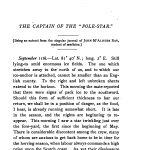All argument and persuasion were vain, so the manager had dolefully to clear the ship once more.
And then Copley Banks began to make preparations for his African voyage. It appeared that he relied upon force rather than barter for the filling of his hold, for he carried none of those showy trinkets which savages love, but the brig was fitted with eight nine-pounder guns and racks full of muskets and cutlasses. The after sail-room next the cabin was transformed into a powder magazine, and she carried as many round shot as a well-found privateer. Water and provisions were shipped for a long voyage.
But the preparation of his ship’s company was most surprising. It made Freeman, the manager, realise that there was truth in the rumour that his master had taken leave of his senses. For, under one pretext or another, he began to dismiss the old and tried hands, who had served the firm for years, and in their place he embarked the scum of the port—men whose reputations were so vile that the lowest crimp would have been ashamed to furnish them.
There was Birthmark Sweetlocks, who was known to have been present at the killing of the log-wood cutters, so that his hideous scarlet disfigurement was put down by the fanciful as being a red afterglow from that great crime. He was first mate, and under him was Israel Martin, a little sun-wilted fellow who had served with Howell Davies at the taking of Cape Coast Castle.
The crew were chosen from amongst those whom Banks had met and known in their own infamous haunts, and his own table-steward was a haggard-faced man, who gobbled at you when he tried to talk. His beard had been shaved, and it was impossible to recognise him as the same man whom Sharkey had placed under the knife, and who had escaped to tell his experiences to Copley Banks.
These doings were not unnoticed, nor yet uncommented upon in the town of Kingston. The Commandant of the troops—Major Harvey, of the Artillery—made serious representations to the Governor.
“She is not a trader, but a small warship,” said he. “I think it would be as well to arrest Copley Banks and to seize the vessel.”
“What do you suspect?” asked the Governor, who was a slow-witted man, broken down with fevers and port wine.
“I suspect,” said the soldier, “that it is Stede Bonnet over again.”
Now, Stede Bonnet was a planter of high reputation and religious character, who, from some sudden and overpowering freshet of wildness in his blood, had given up everything in order to start off pirating in the Caribbean Sea. The example was a recent one, and it had caused the utmost consternation in the islands. Governors had before now been accused of being in league with pirates, and of receiving commissions upon their plunder, so that any want of vigilance was open to a sinister construction.
“Well, Major Harvey,” said he, “I am vastly sorry to do anything which may offend my friend Copley Banks, for many a time have my knees been under his mahogany, but in face of what you say there is no choice for me but to order you to board the vessel and to satisfy yourself as to her character and destination.”
So at one in the morning Major Harvey, with a launchful of his soldiers, paid a surprise visit to the Ruffling Harry, with the result that they picked up nothing more solid than a hempen cable floating at the moorings. It had been slipped by the brig, whose owner had scented danger. She had already passed the Palisades, and was beating out against the north-east trades on a course for the Windward Passage.
When upon the next morning the brig had left Morant Point a mere haze upon the Southern horizon, the men were called aft, and Copley Banks revealed his plans to them. He had chosen them, he said, as brisk boys and lads of spirit, who would rather run some risk upon the sea than starve for a living upon the shore. King’s ships were few and weak, and they could master any trader who might come their way. Others had done well at the business, and with a handy, well-found vessel, there was no reason why they should not turn their tarry jackets into velvet coats. If they were prepared to sail under the black flag, he was ready to command them; but if any wished to withdraw, they might have the gig and row back to Jamaica.
Four men out of six-and-forty asked for their discharge, went over the ship’s side into the boat, and rowed away amidst the jeers and howlings of the crew. The rest assembled aft, and drew up the articles of their association. A square of black tarpaulin had the white skull painted upon it, and was hoisted amidst cheering at the main.
Officers were elected, and the limits of their authority fixed. Copley Banks was chosen Captain, but, as there are no mates upon a pirate craft, Birthmark Sweetlocks became quartermaster, and Israel Martin the boatswain. There was no difficulty in knowing what was the custom of the brotherhood, for half the men at least had served upon pirates before. Food should be the same for all, and no man should interfere with another man’s drink! The Captain should have a cabin, but all hands should be welcome to enter it when they chose.
All should share and share alike, save only the captain, quartermaster, boatswain, carpenter, and master-gunner, who had from a quarter to a whole share extra. He who saw a prize first should have the best weapon taken out of her. He who boarded her first should have the richest suit of clothes aboard of her. Every man might treat his own prisoner, be it man or woman, after his own fashion. If a man flinched from his gun, the quartermaster should pistol him. These were some of the rules which the crew of the Ruffling Harry subscribed by putting forty-two crosses at the foot of the paper upon which they had been drawn.
So a new rover was afloat upon the seas, and her name before a year was over became as well known as that of the Happy Delivery. From the Bahamas to the Leewards, and from the Leewards to the Windwards, Copley Banks became the rival of Sharkey and the terror of traders. For a long time the barque and the brig never met, which was the more singular, as the Ruffling Harry was for ever looking in at Sharkey’s resorts; but at last one day, when she was passing down the inlet of Coxon’s Hole, at the east end of Cuba, with the intention of careening, there was the Happy Delivery, with her blocks and tackle-falls already rigged for the same purpose.
Copley Banks fired a shotted salute and hoisted the green trumpeter ensign, as the custom was among gentlemen of the sea. Then he dropped his boat and went aboard.


